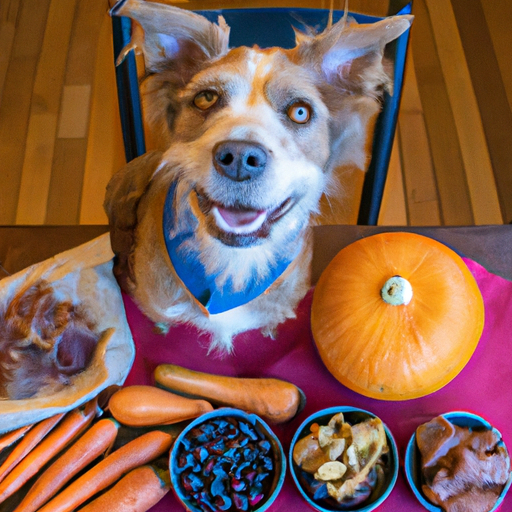As a caregiver for your furry friend, it’s crucial to know what foods are safe for them to consume. Let’s explore some foods that are healthy and safe for dogs to eat.
1. Lean Meats
Most dogs love meat! Lean meats like chicken, beef, and turkey are great sources of protein. However, ensure they are cooked properly and free from bone and fat.
Healthy Preparation Methods:
- Boiling
- Grilling
Remember, avoid adding seasonings or spices, which can be harmful to dogs.
2. Fish
Fish such as salmon and tuna are filled with beneficial omega-3 fatty acids. These fats support your dog’s immune system and can be beneficial for their skin and coat health.
| Fish Type | Omega-3 Fatty Acids | Protein |
|---|---|---|
| Salmon | High | High |
| Tuna | Medium-High | High |
Always serve fish cooked and bone-free.
3. Peanut Butter
Unsalted and unsweetened peanut butter is an excellent treat for dogs. It’s a good source of protein and healthy fats. However, avoid brands that contain xylitol, a sugar substitute that’s toxic to dogs.
4. Carrots
Carrots are low in calories and high in fiber and vitamins. They make a great snack for your pup! They’re also beneficial for your dog’s dental health as they help clean their teeth.
5. Blueberries
Blueberries are a superfood packed with antioxidants, which can be beneficial for your dog’s health. They’re a perfect low-calorie treat for dogs.
6. Sweet Potatoes
Sweet potatoes are high in dietary fiber, vitamin B6, vitamin C, and beta carotene. Cook them thoroughly and serve in small amounts to avoid stomach upset.
7. Pumpkin
Pumpkin is a good source of fiber and vitamin A. It can help with digestive regularity if your dog is experiencing issues.
8. Rice and Pasta
Rice and pasta are easy to digest and can help a dog with an upset stomach to recover. Always serve these carbs cooked and unseasoned.
Cooking Tip: White rice can cause a spike in blood sugar levels, so brown rice is a healthier option for dogs.
Frequently Asked Questions
1. Can dogs eat all fruits and vegetables?
No, not all fruits and vegetables are safe for dogs to eat. For example, onions, garlic, and grapes are toxic to dogs.
2. Can dogs eat dairy products?
Some dogs can tolerate dairy products, while others cannot. It’s best to give dairy in small amounts and monitor for any signs of upset stomach or allergic reactions.
3. Can dogs eat raw meat or fish?
Feeding dogs raw meat or fish can lead to foodborne illnesses, so it’s always recommended to serve these foods cooked.
4. What should I do if my dog eats something harmful?
If your dog eats something harmful, contact your vet immediately. They can guide you on the necessary steps to take based on the type and amount of food consumed.
5. How often can I give my dog these foods?
The foods listed above should be given as treats and should not replace a balanced dog diet. Always follow the 10% rule – treats should make up no more than 10% of your dog’s total calorie intake.
Remember, every dog is unique and may react differently to certain foods. Always introduce new foods gradually and watch for any signs of allergies or upset stomach.



